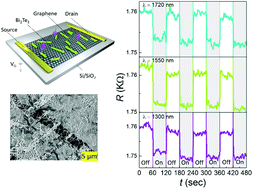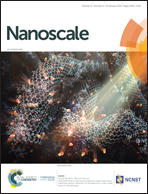Ultra-sensitive graphene–bismuth telluride nano-wire hybrids for infrared detection†
Abstract
The myriad technological applications of infrared radiation sensors make the search for ultra-sensitive detectors extremely crucial. Materials such as bismuth telluride (Bi2Te3), having a small bulk band gap of 0.17 eV, are ideal infrared detectors. However, due to the high recombination rate of photo-generated charge carriers in the bulk, the electrical response under optical illumination is typically very weak in these materials. We have circumnavigated this by sensitizing graphene with Bi2Te3 nano-wires. These hybrid devices show an ultra-high sensitivity of ∼106 A W−1, under incident electromagnetic radiation from 940 nm to 1720 nm. The theoretical limit of the noise equivalent power and specific detectivity in these devices are ∼10−18 W Hz−1/2 and ∼1011 Jones respectively, which are comparable to those of some of the best known detectors.



 Please wait while we load your content...
Please wait while we load your content...